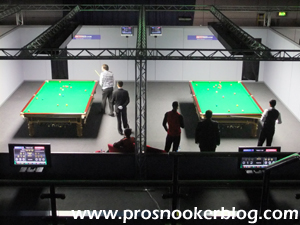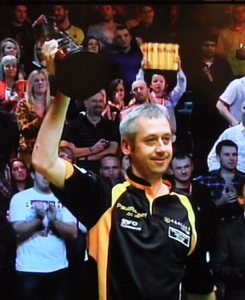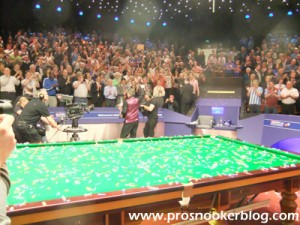
Since the return of Barry Hearn to the professional game there have been a number of positive changes implemented, but one issue that has perhaps gone unnoticed are the continued financial difficulties faced by those lower down the rankings. As a result I thought that it would make interesting reading to take an independent look at that in more detail…
Introduction
With prize money up from £3.5m to around £6m little over a year after the arrival of Barry Hearn and the amount of tournaments having increased significantly in comparison to the old days, there can be little doubt that those who are successful at the top of the game now have the opportunity to earn the levels of prize money that their talents deserve.
There are however 99 professionals on the tour at present in addition to at least as many amateur players hoping to make the step up through competing during the PTC events and from talking to various people in the game over the last few months it has
become evident to me that financing this is far from easy for those lower down the rankings.

As a result I recently decided to have a chat with some people in the know to give me an idea as to how expensive it is to compete on the tour and get a feel for just how tough it is for players from an independent point of view.
In order to do so I am going to consider the PTC series followed by the recent Australian before looking at a season overall in an attempt to draw some conclusions on the matter.
The Players Tour Championship
As everyone knows, the PTC series has already in the space of one year become an integral part of the snooker season, not just for the professionals but also the amateurs in 2011/12 following the decision to give them a route onto the main tour through the series if they can finish inside the top eight on the Order of Merit excluding those ranked inside the top 64 on the main two-year ranking list.
In terms of importance then it has now become clear (if it was not already), that it is absolutely crucial for almost all of the professionals to enter each event else suffer the consequences in terms of their ranking. For some this may be that they drop down a tier and have to come through an extra qualifier in order to make the venues but for many others this could well be the difference between survival or relegation from the main tour.
For those players without other commitments, players with sponsors and so on, the PTC is excellent match practice and a chance to knuckle down and work their way up the rankings ahead of the majors. For those with full-time jobs, children and few sponsors however, there is real pressure on them to win each and every match in order to cover their costs, let alone make a profit.

Why is this?
The domestic PTC events are relatively affordable with an entry fee of £100 per event together with travel fees to either Sheffield or Gloucester depending on where they live (say something ranging between £30-£100 for petrol, ferry or flight costs), and another £50-£150 for a hotel depending on how many nights they stay in the competition for as well as the costs of food and drink.
Add on a 2.5% World Snooker levy on prize money and for most you are probably looking at total costs ranging from something like £250-£400 per event for your average player.
On the face of it this is not too bad for the professionals as with £200 available for one win this will cover a portion of their costs while the £600 on offer for two wins does present the opportunity to make a bit of money if the results are there.
It is not so easy for the amateurs this season however as with the huge upturn in entries due to the pro places on offer, some will have to win two, some even three pre-qualifying matches to even get to this stage. Taking into account the extra days they will have to stay in a hotel for in order to play these matches, it is probably fair to say that some have to win five matches to even make a profit.
Certainly they must win that amount of matches to earn money on the Order of Merit and put themselves into the race for those elusive tour spots.

The European PTC events are where the issue is really brought home though because as well as the £100 entry fee, hotel costs and 2.5% World Snooker levy, the players also have to pay for their own flights which can range from £100-£250 depending on where the event in question is being staged, as well as other potential costs such as luggage space for their cues, airport parking and even the petrol to get to the airport which may come to another £50-£100.
Less obvious is the fact that while the prize money for the overseas events is paid in euros, all of the entry fees are actually paid in sterling which while not something that will make a huge difference, over the course of a season with money hard to come by all mounts up. Furthermore European taxes are also deducted from prize money up front.
On this basis then from what I understand then players will not be getting much change from £500 when it comes to the costs of competing in those events which means that they effectively have to reach the last 16 stage if they are to be profitable.
Again for the higher ranked professionals this is a relatively small price to pay but for those outside of the top 32 and particularly the amateurs, you can easily see how the costs soon become prohibitive with twelve PTCs on the calendar, six being overseas.

Full Ranking Events – Australia
While that covers the PTC events, what is the situation when it comes to a tournament such as the new Australian Goldfields Open event?
With a prize of $7,500 Australian dollars on offer for those losing at the last 32 stage, this converts to approximately £4,900, at first glance a fairly reasonable sum. Looking more closely however, when taking into account a reported Australian tax on prize money of 46% as well as flight costs of £1,000-£1,500, those losing in the last 32 stage are in real terms not going to receive half of that amount.
Furthermore for the qualifiers there are also the costs of funding travel plus accommodation for however many days they have had to spend in Sheffield, as well as their entry fees of course, let’s say that comes to another £250. On the other hand though it should be pointed out that their accommodation in Australia has been paid for.
Another important point about this particular event is that as was the case at the German Masters, there is no prize money on offer at all until the last 48 stage, eg the final qualifying round which is a stage later than is normally the case. Presumably a decision taken in order to raise the prize fund available for those making the trip to Australia, it does not quite seem right that someone seeded as high as 33rd should not receive prize money, even if the reasoning has a certain logic to it.
With the prize fund moving up a small step to $10,000 at the last 16, in order to make the trip seriously profitable then realistically a quarter-final place is required, something that only eight of the 32 players can achieve.

So what does all this mean?
While the above figures are ballpark figures only and will differ from player to player, over the course of the season then it is fair to say that while prize money has increased, so too have the expenses and not by an insignificant amount with the amount of PTC events that players simply have to enter if they have any ambition of moving up the rankings.
On the figures detailed above it is not unrealistic that expenses on the PTC events alone could come to around £5,000-£6,000 which you can probably double when taking into account the remaining major events, depending on how many are entered and geographically where a player is situated relative to airports and qualification venues.
For those inside the top 16 and perhaps even the top 32 then while a lot of money, barring a disastrous season it is probably fair to assume that the majority will be able to handle such costs and come out with a profit at the end of it, particularly with a good run at the Crucible or the Masters.
Beyond these ranking tiers however it is a different ball game. One relatively highly ranked player recently told me that during the last season he earned approximately £15,000 after expenses which in the grand scheme of things is hardly a fortune and not what you would expect for a professional sportsman.

With prize money limited to the top 64 in the majority of full-ranking events, the top 48 in some such as Australia and the German Masters last season, it is apparent that it is a tough school for those in the bottom half of the rankings. Rumours are abound that various players are having to take out loans in order to fund tournaments and it would appear in the case of Igor Figueiredo that a lack of finance has played a part in his decision not to enter all of the events this season.
Effectively players are now in a situation where they are choosing to ‘buy’ both experience and ranking points.
Is this fair?
Since being handed the reins of World Snooker in June 2010 Barry Hearn has maintained that he wants snooker to reward achievement and in the context of the new Q School avoid a ‘circuit for mediocrity’ which has to be a good attitude to take. All competitive sport should reward success and those who win tournaments should be the ones to benefit the most.
It is also clear to see now that if players are good enough there is a real opportunity to rise up the rankings by virtue of the increased calendar and the mid-season ranking changes which more accurately reward current form than in the past. While expenses were lower previously, the opportunities for players to earn the money back in order to pay for these were also far fewer beforehand so I would certainly agree with the majority that snooker is in a better state than it has been recently.
In addition to the ranking events there are also invitational tournaments such as the Premier League, Championship League, Sky Shoot Out and more which allow the players to top up their income if they are good enough and again demonstrates that the opportunities are there.

That said however, at the same time that does not mean that the situation is yet perfect. In an ideal world I would like to see a situation where all 96 main tour players are paid something in the major events, even if in the case of first-round losers it is just enough to cover their costs.
Indeed, the subject of expenses was one that quickly came up back in March when I interviewed Stuart Pettman ahead of the release of his book and asked him what his view was in terms of the direction that snooker is heading in:
“Personally I’d say that for the people who go to Q School or those who are thinking of doing that, they know that if they qualified for the main tour, they probably have to come up with £10,000 in expenses, that might be a bit on the high side but it won’t be
far off that.
Now if they want to be earning a living in the game then they are going to have to be earning £30,000-£40,000 which is very, very hard as the game today is of a ridiculously high standard. For an amateur to come onto the tour and earn that kind of money is not likely to happen so I think that the money situation in the lower ranks of the game is fairly poor. I think it’s geared up to an extent so that the money is for the top 32 to make a good living. I think that’s the problem, if I could change anything then that would be it.”
In reality the money simply isn’t there for the players all the way down to 99 to receive a healthy amount right now and understandably for the promoters it is the headline top prizes that will grab the headlines, not those distributed lower down.
Still, as referred to previously, it does not seem right that at some events prize money is not awarded until the final qualifying round. While rewarding achievement is what it is all about, I would argue that for a tour newcomer for example to win two matches in qualifying against experienced opponents is an achievement that should be rewarded financially
What about the PTC events? While it is great for the game to have more events, is there anyway that these could be better structured financially? Two possibilities spring to mind.

The first option on the face of it would be to simply reduce the amount of individual events, whilst increasing the prize money which would not only mean that the players are fighting for more money, but will also see their expenses reduced. The obvious downside is that this would fly in the face of the desire to expand the game globally and to stage more events, while for the governing body there is no reason to do this as they are currently making money from the PTC as a result of the entry fees that they are receiving. It could however be of great assistance to those trying to make a living in the game.
A second option would be to keep the amount of events as it is, but to create a ‘best of’ format similar to that used in tennis and previously in snooker in the old PIOS which would mean that players could opt out of certain events should they wish to without being penalised heavily in the rankings. While this would make updating my projected seedings page a minefield, I think that there would be some merit in this.
Perhaps a further idea would be to spread the levels of prize money available out for the qualifiers more evenly while increasing the gap between the last 48 and the last 32 to provide a greater reward for those making it to the venues. For example what of a system by which the last 80 receive £400, the last 64 £500, the last 48 £600 and then a major step up to say £5,000 for last 32? This would effectively provide all professionals with almost a minimum wage, but would of course disadvantage those ranked just outside the top 16 if they were to make fewer venues.
In the context of the amateurs the situation is particularly tough because not only may they have to win four or five matches against strong opposition in order to make their money back, but of course they also face the prospect of having to find £1,000 in order to enter the season-ending Q School with no prospect of prize money at the end of it.

This does beg the question of what happens to those Q School entry fees. Could a portion of that income should be directly invested back into increasing the prize fund for those outside of the top 32?
Again Stuart Pettman raised this question during our chat previously:
“Take a look at the Q School, why can’t they give the players who get through £5,000, something that they are guaranteed because they are one of the best players in the world, they deserve something for their efforts which would take a bit of the pressure off and give them more incentive to get on the tour as well. If they (World Snooker) are getting £128,000 in entry fees then they could use that money for the people who qualify, help them on their way, that’s my view on it.”
Final Thoughts
So then while I am sure that there are things that I have missed out, hopefully this article has shed a little light on the difficulties faced by those hoping to make their way up the rankings, indeed even those hoping to get onto the tour and serves to create a bit of debate on the subject.
Obviously there is only so far that we can speculate from the outside and I must stress that I am looking at this from an independent fan/blogger point of view which I think is important.
Generally speaking I would say that despite the increased costs, the sport is now in a better position than it was a couple of years ago and with more and more tournaments springing up, while in the short-term these are probably for the benefit of those at the top of the game, hopefully it will work to everyone’s advantage in the longer term.

That said however, the costs for those further down are clearly not to be underestimated and given the pressure involved both on and off the table, it remains to be seen whether all of the current tour players will make it to the end of the season and whether the later PTCs are as well supported entry-wise as the earlier ones.
There is an argument to state that if players are good enough then they will win enough matches in order to cover their costs and climb up the rankings and I do agree that those at the top should be those to receive the biggest rewards from the game.
Despite that however in an ideal world the sport should be sustainable for those at all levels and at the moment judging by some of the figures above that is not quite the case at the moment. At any time in any sport there are always going to be players at different stages in their career and of different levels of ability and I would argue that all are needed. That is just the natural way of sport and all bring something to the game in their own way.
With the rising costs however, it seems inevitable that some will find themselves priced out of the sport as time progresses which would be a shame to see.
